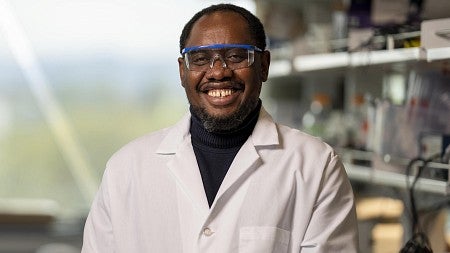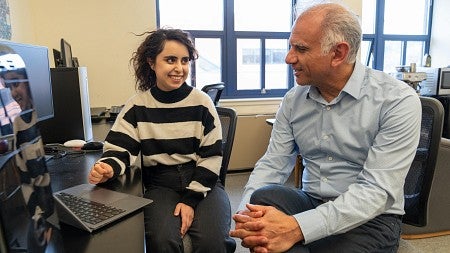Duck Masterminds Breakthroughs in Cybersecurity
Sushil Jajodia, PhD graduate, receives IEEE McDowell Award
By Melody Ward Leslie • October 7, 2020
5 min read

He says he is an optimist, but Sushil Jajodia spends his time imagining the worst things hackers might come up with, from stealing information to stymying anything from financial systems and power grids to government agencies and the “internet of things.”
Now Jajodia, a cyber defense expert and 1977 PhD mathematics graduate of the University of Oregon, has received one of the most prestigious honors available to the world’s computer scientists.
For his “contributions to the scientific and engineering principles that enable adaptive cyber defense,” the IEEE Computer Society has recognized Jajodia with the 2020 W. Wallace McDowell Award. His research helps vast enterprises such as the Department of Defense and the IRS become more adept at identifying and defeating hacking attempts in real time.
“The award was a surprise to me,” says Jajodia, who is also an IEEE Fellow. “Emmys are given every year, tons of them, but there is only one McDowell Award. If you look at the number of computer scientists to actors, it is easier to appreciate the rarity of this honor. I feel humble and grateful.”
As founding director of the nation’s Center for Secure Information Systems, Jajodia helps create and constantly improve systems protecting military secrets, intellectual property, business plans, and financial information. His center is housed in George Mason University’s Volgenau School of Engineering, where he holds two endowed faculty positions, University Professor and BDM International Professor.
“I am a professor,” he says. “That is what I love. Research is my driver. I had good training at Oregon in how to think, and in how to identify and tackle problems. All of that is critical in my career.”
And there is more. Jajodia also is founding director of the National Science Foundation’s Center for Cybersecurity Analytics and Automation. This center, part of the NSF’s Industry-University Cooperative Research Centers Program, focuses on building a healthy cyber ecosystem by providing predictive analytics and proactive mitigation against sophisticated advanced persistent threats and malware attacks.
In each of his roles, Jajodia leads international research teams working to anticipate the needs of a world where the complexity of IT systems is increasing exponentially. “Most of my work involves securing your information,” he says. “For example, we must secure the Internal Revenue Service’s assets so that outsiders cannot gain access to them.”
He also leads efforts to protect the US from nation-states trying to harm Department of Defense systems. “I am trying to come up with ways to secure systems used by the US Army,” he says. “That is a huge challenge, but that is what makes it fun. My students and colleagues continue to make progress.”
There is, he says, a distinction between privacy and security. “Privacy is that you do not want your personal information to be disclosed. Security is that I want information to be secret, which is next to impossible because we must give information to others so they can help us.”
Jajodia came to the US as an international student from Kolkata, India, where his family had been engaged in business for generations. “Somehow I became interested in pure mathematics,” he says, and he has fond memories of six years spent in Eugene while completing his doctoral thesis.
He went on to faculty positions at the University of Oklahoma, University of Wisconsin-Stevens Point, and University of Missouri before being lured to build a “test bed” database for the Reagan administration’s Star Wars initiative. Next, he directed the Database and Expert Systems Program within the Division of Information, Robotics, and Intelligent Systems at the National Science Foundation, an experience that clinched his desire to settle in the DC area.
In 1988, he joined the faculty of George Mason University in Fairfax, Virginia. “I love living in the tri-state region,” he says. “I like the excitement of being surrounded by highly driven people who are successful go-getters. You are only limited by your imagination. If you have an idea, you can get support.”
He arrived in Fairfax determined to do something about the then-new threats posed by hackers. In less than two years, he won funding to launch the first academic center for information security at a US university. “I was working on databases, and I realized that no one was focusing on security problems,” he says. “I wanted to create a critical mass so we can produce students trained in security, while doing research on it, and working on solutions for business, industry, and government.”
Since then he has won 23 patents, mentored 27 students to their doctorates, authored or coauthored seven books, edited 52 other books and conference proceedings, and published more than 500 technical papers. One of his newest grants, from the Department of Defense, funds a joint project with Dartmouth University to develop a machine learning-based defense model and implement a toolkit to automatically find and generate secret security patches.
He and his wife, Kamal, share all that success with the UO through gifts including a scholarship fund that helps support three students a year from India. “I received the Ghent Scholarship when I was a student at the UO, and it meant a lot to me at that time,” he says. “I feel that education is the best thing anyone can do for another human being because you make a difference not only in their life, but also that of their family for generations after.”
As busy as he is, he makes time to follow the Ducks and he stays in touch with his dissertation adviser, UO Professor Emeritus Allan Sieradski. In fact, he looks forward to installing one of Sieradski’s abstract sculptures in his home soon. He says it is based on a mobius strip, or the infinity symbol, or two people, depending on one’s frame of reference. “I am so honored to have a sculpture from my advisor,” Jajodia says. “He has a wonderful visual imagination.”
Melody Ward Leslie, BA ’79 (humanities) is a staff writer for University Communications.




